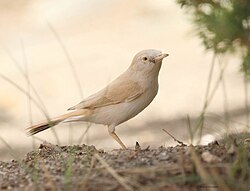African desert warbler
Topic: Biology
 From HandWiki - Reading time: 2 min
From HandWiki - Reading time: 2 min
| African desert warbler | |
|---|---|

| |
| Scientific classification | |
| Domain: | Eukaryota |
| Kingdom: | Animalia |
| Phylum: | Chordata |
| Class: | Aves |
| Order: | Passeriformes |
| Family: | Sylviidae |
| Genus: | Curruca |
| Species: | C. deserti
|
| Binomial name | |
| Curruca deserti (Loche, 1858)
| |
| Synonyms | |
| |
The African desert warbler (Curruca deserti) is a typical warbler.
Taxonomy
Until recently it was considered conspecific with the Asian desert warbler (and called just "desert warbler"),[2] but is now given specific status.[3][4] The two are still each other's closest living relatives, and their relationships to other typical warblers are not clear; they may be fairly close to the common whitethroat. But it seems that all these three taxa are fairly basal members of the genus.[5][6]
Distribution and habitat
The warbler breeds in the deserts of north-western Africa south of the Atlas Mountains from southern Morocco east to western Libya and south to Mali and Niger. It winters in the same area, and does not migrate other than short distances.
Description
It is a small bird, marginally the smallest in the genus, 11–12 cm long, and 7–10 g weight. The sexes are almost identical in colour, pale sandy yellow-brown above and whitish below; the bill and legs are yellowish, and the eye has a yellow iris; it differs from the Asian desert warbler in its more yellowish overall colour.
Behaviour
Like its relatives, it is insectivorous, but will also take small berries; unlike most warblers, it commonly feeds on the ground. The song is a distinctive jingle often given in an advertisement flight, with clear notes (differing from Asian desert warbler in having few harsh notes[4]). It breeds in desert and semi-desert environments, as long as some scattered bushes for nesting occur. The nest is built in low shrub, and 2–5 eggs are laid.[2][4]
References
- ↑ BirdLife International (2017). "Curruca deserti". IUCN Red List of Threatened Species 2017: e.T22734413A111152386. doi:10.2305/IUCN.UK.2017-1.RLTS.T22734413A111152386.en. https://www.iucnredlist.org/species/22734413/111152386. Retrieved 20 October 2022.
- ↑ 2.0 2.1 Del Hoyo, J., Elliot, A., & Christie, D. (editors). (2006). Handbook of the Birds of the World. Volume 11: Old World Flycatchers to Old World Warblers. Lynx Edicions. ISBN:84-96553-06-X.
- ↑ IOC World Bird List version 2.9: Old World Warblers
- ↑ 4.0 4.1 4.2 Svensson, L., Mullarney, K. & Zetterström, D. (2009). Collins Bird Guide, second edition. HarperCollins, London ISBN:978-0-00-726726-2.
- ↑ Helbig, A. J. (2001). The characteristics of the genus: Phylogeny and biogeography of the genus Sylvia. Pages 24–28 in: Shirihai, H., Gargallo, G., Helbig, A. J., & Harris, A. Sylvia Warblers. Helm Identification Guides ISBN:0-7136-3984-9
- ↑ Jønsson, K. A., & Fjeldså, J. (2006). A phylogenetic supertree of oscine passerine birds (Aves: Passeri). Zool. Scripta 35 (2): 149–186. doi:10.1111/j.1463-6409.2006.00221.x (HTML abstract).
Wikidata ☰ Q110257493 entry
 |
 KSF
KSF

